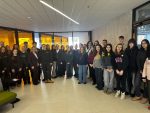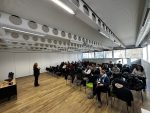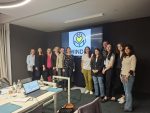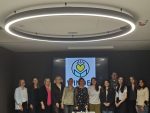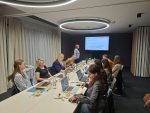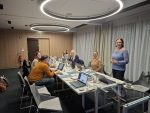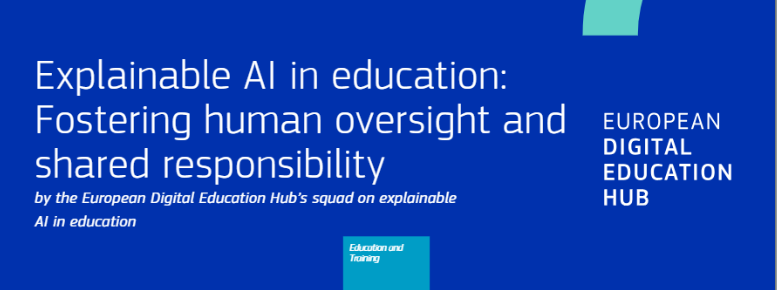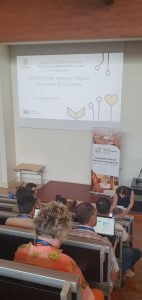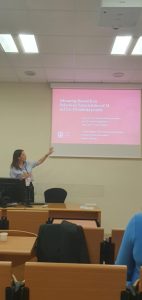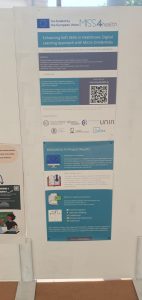Meeting in VMU with international group of students and teachers
This week, VDU ISI welcomed students and teachers from Kaunas Maironio University Gymnasium and participants of their international Erasmus+ mobility project “From Diversity to Unity: Strengthening International Relations through Peer Learning.” They were welcomed by the deputy director of VDU ISI, Assoc. prof. dr. Estela Daukšienė, who agreed to share her thoughts about the meeting and its novel approach.
What kind of guests visited VMU?
Kaunas Maironio University Gymnasium is participating in the international Erasmus+ mobility project “From Diversity to Unity: Strengthening International Relations through Peer Learning.” Students and teachers from Poland, Romania, and Turkey have come for a week of project activities. Twenty-four students and nine teachers are participating in the project. The main theme of the project is unity through diversity, with a special focus on gender equality. During the activities, students participate in seminars, discussions, creative workshops, and educational trips around Lithuania. The project promotes intercultural communication, tolerance, and active cooperation between young people from different countries. Guests live with host families, which gives them the opportunity to get to know Lithuanian culture, traditions, and everyday life more closely. Such projects not only strengthen international friendship and openness, but also significantly contribute to the development of students’ social, linguistic, and civic skills and to the formation of a common European identity.
What was special about the meeting and the guests’ visit to VMU?
VDU often welcomes project partners from various countries, universities, and schools. However, this meeting was somewhat different, as its purpose was not only to share information about VDU and discuss career opportunities, but also to allow students to prepare questions in advance and subsequently prepare their reports, which we are eager to see later.
So, after a short presentation about the university and my areas of activity, which include teaching at VMU Education Academy, consulting lecturers and students, testing and implementing innovations at ISI, collaborating with the LieDM association (where I have been actively involved for 15 years) and EDEN DLE (where I am a Management board member), I spent an hour answering the students’ questions.
It may sound strange, but I sincerely wish everyone could have such an experience. It was an opportunity to reflect on what you do, the values you follow, what you have achieved (without boasting, but reflecting), what you still strive for, and what advice you would give to others. It was great to hear the students’ profound, sometimes philosophical questions, and to see and admire young people and their desire to learn from others. The questions were very diverse, ranging from the structure of the university and the importance of study opportunities to student involvement in events and university departments, to personal career paths, discussions about the future of education, artificial intelligence, and the skills students will need in the future.
The most interesting questions were:
- As a lecturer advancing your career, which is more important: courage or patience?
- What was the biggest obstacle in your career?
- How do your university’s students stand out from others after graduation?
- How many international students study at your university?
- Are courses taught in English?
- Which programs are most popular?
- How did you begin your career? What is the most important thing in pursuing a career?
- How do you envision the future of education?
- What should teachers teach students in the digital age? How can teachers determine what students will need in the future?
Since the project is related to equal opportunities, there were questions about whether I encounter discrimination in my field, how I would feel if a male colleague with similar qualifications applied for the same position, whether that would intimidate me, and how we ensure equal opportunities at the university.
It’s great that there are projects like this that create extraordinary experiences for students, teachers, and those around them (in this case, university lecturers :). We recommend that other lecturers also reflect on how they got to where they are and how they achieved what they have achieved.
Recommendations for teachers before the start of the new semester
- Check whether the course code(s) in the Moodle environment and the study program network and/teacher portal.
- Please note that it is necessary to update the MS Teams meeting/room links in the course (delete the previous semester and create new one). How to create MS Teams meeting room in Moodle
- Update the dates of existing activities. It is possible to check and see the set dates of all activities at once -> Administration -> Course administration -> Reports -> Dates.
- Pay attention to whether the educational material is available (visible) to students (you can check this by activating the student role by clicking on your name in the upper right corner in Moodle and then Switch role to -> Student).
- Delete messages from previous semesters that were sent to the learners via discussion forum.
- Update the study description (the student guide).
- Delete student test attempts from the previous semester (it is required if you want to add/delete questions in the test activity).
- View whether uploaded video materials (videos, links, etc.) are available to students.
- Pay attention whether the authorship in your uploaded slides is indicated.
If you have any questions, please write to us by e-mail nuotolines@vdu.lt
Wishing a happy holiday season

National Scientific Seminar: Teaching and Learning in the Age of Artificial Intelligence (AI)
On October 17, 2025, a national scientific seminar “Teaching and Learning in the Age of Artificial Intelligence (AI): Challenges and Opportunities for Teachers” was held to present the results of the research “Digital Didactics Research: Application of Artificial Intelligence Elements in General Education (AI-didactics)”, No. P-EDU-23-1, which is a part of a national research project “Breakthrough in Educational Research”.
The seminar was opened by a leading researcher and project coordinator prof. dr. Airina Volungevičienė, who provided a conceptual and broader contextual perspective on Artificial Intelligence (AI) in Education, reviewing current initiatives and regulation at both the international and national levels. After introducing the seminar participants to the research project “DI-daktika”, its goal, objectives, and planned activities, significant attention was given to presenting and discussing the didactical aspects of using AI elements for teaching and learning, based on the completed analysis of scientific sources and empirical data. These presentations served as an important contribution to the subsequent seminar activity, where participants discussed in groups what new knowledge, skills, and attitudes school teachers require for effective teaching, learning and assessment.
To bring the results of the discussion into relevance and context, the seminar also featured the presentation of a draft AI competence taxonomy, providing fundamental insights for further activities within the research project „DI-daktika“. This national scientific seminar confirmed the significant interest of education community in the sustainable and effective integration of AI into educational practice, emphasizing the need to further develop didactic and digital competencies, the awareness of ethical AI usage aspects, sharing of best practices, and the need for critical thinking on the part of both teachers and learners.
Seminar agenda (in Lithuanian).
More about the research „DI-daktika“ – https://studyonline.lt/en/di-daktika-3/.
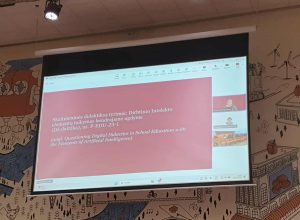
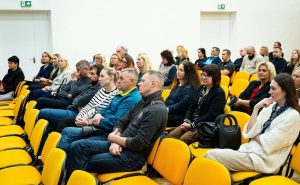
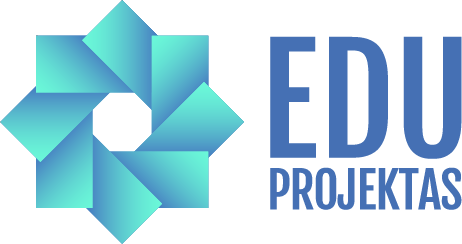


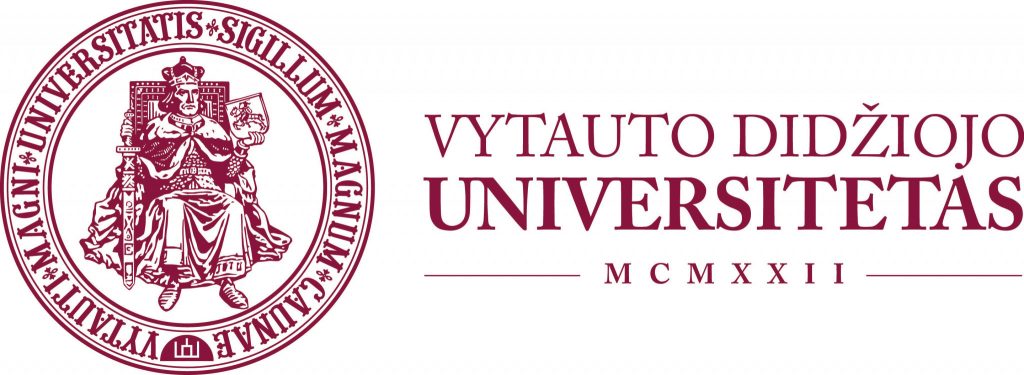
Project funding: This research No P-EDU-23-1 is co-funded by the European Union (the project “Breakthrough in Educational Research” No 10-044-P-0001) under the 1st April 2025 Agreement with the Research Council of Lithuania (RCL) and the 17th April 2025 Joint Activity Agreement with Vytautas Magnus University.
Coordinator of the project “Breakthrough in Educational Research”: RESEARCH COUNCIL OF LITHUANIA
WINDEE Project meeting in Ljubljana
![]()
On September 24–25, a meeting of partners in the international project Well-being in Digital Education Ecosystem (WINDEE), coordinated by the Institute of Innovative Studies at Vytautas Magnus University, took place in Ljubljana.
During the meeting, project partners from various European countries and institutions discussed the project’s progress, the achieved results, and the next steps. At the centre of the discussions was the project’s key theme: the well-being of students and teachers in digital education.
The project began with extensive evidence gathering aimed at identifying the main factors shaping teachers’ and learners’ experiences in digital learning environments. A systematic literature review was conducted, along with a policy mapping report on existing European and national-level policies related to digital well-being in education, highlighting gaps, opportunities, and best practices to inform future policy development and implementation strategies. In addition, project researchers analysed more than 100 digital tools and technologies used in education and their potential impact on learners’ digital well-being. The results form a strong foundation for further project activities and the next stage – the development of a Digital Well-being Framework.
At the Ljubljana meeting, participants discussed the key components of digital well-being in education at both the classroom and school levels. Partners shared experiences, insights, and practical examples on how to ensure responsible use of technology and create a digital environment conducive to learning. Meeting participants also focused on designing a concept for identifying good practices, as well as collecting and describing case studies. All of this will contribute to the creation of the Digital Well-being Framework.
The Digital Well-being Framework is one of the most important outcomes of the project. It will present principles, strategies, and guidelines for responsible use of technology, helping teachers and educational institutions make appropriate choices when integrating technologies into the teaching and learning process. It will be tested in real educational environments through experiments, analysis of their results, and evaluation of their practical impact.
The outcomes of this meeting not only strengthened collaboration among project partners but also paved the way for the further development of the WINDEE project, which will contribute to higher-quality, more balanced, and well-being-oriented digital education in Europe.
DISCLAIMER: “Funded by the European Union. Views and opinions expressed are however those of the author(s) only and do not necessarily reflect those of the European Union or the European Education and Culture Executive Agency (EACEA). Neither the European Union nor EACEA can be held responsible for them.”
EU Publishes Report on Explainable Artificial Intelligence in Education
In October, we announced that our institute’s researchers, Airina Volungevičienė and Giedrė Tamoliūnė, had participated in the international workshop “Explainable AI in Education”, organized by the European Digital Education Hub (EDEH). In addition, Giedrė Tamoliūnė was a member of the EDEH Explainable AI (XAI) working group, contributing to the development of a comprehensive report on the topic.
We are pleased to share that the outcome of this intensive collaboration — the report “Explainable AI in Education: Fostering Human Oversight and Shared Responsibility” — has now been officially published by the Publications Office of the European Union, ensuring broader accessibility and impact.
Why does this report matter?
The publication addresses several critical questions:
- Why is explainability essential in the use of AI systems in education?
- What legal frameworks and requirements must be observed?
- How can the needs of diverse educational stakeholders be met to strengthen trust in AI systems?
- What competences do educators require in order to effectively work with explainable AI?
Explainable AI in education goes far beyond the technical “explanation” of complex models. It represents a fundamental requirement for building trust, enhancing effectiveness, and empowering human agency in learning environments that increasingly rely on AI tools.
Moreover, explainable AI is key to ensuring that emerging technologies remain aligned with educational values, legal standards, and pedagogical goals. Achieving this requires continuous cooperation across disciplines, sectors, and stakeholder communities.
We invite you to explore the full report by following this link.
Moodle support system for teachers and students
We would like to remind you that the following materials have been prepared for lecturers:
- methodological recommendations;
- user guide for working with the virtual learning environment;
- user manuals for video conferencing tools.
Information for students on:
- logging into the VDU virtual learning environment Moodle;
- using video conferencing tools;
- two-factor authentication.
Recommendations for teachers before the start of the new semester
- Check whether the course code(s) in the Moodle environment and the study program network and/teacher portal.
- Please note that it is necessary to update the MS Teams meeting/room links in the course (delete the previous semester and create new one). How to create MS Teams meeting room in Moodle
- Update the dates of existing activities. It is possible to check and see the set dates of all activities at once -> Administration -> Course administration -> Reports -> Dates.
- Pay attention to whether the educational material is available (visible) to students (you can check this by activating the student role by clicking on your name in the upper right corner in Moodle and then Switch role to -> Student).
- Delete messages from previous semesters that were sent to the learners via discussion forum.
- Update the study description (the student guide).
- Delete student test attempts from the previous semester (it is required if you want to add/delete questions in the test activity).
- View whether uploaded video materials (videos, links, etc.) are available to students.
- Pay attention whether the authorship in your uploaded slides is indicated.
If you have any questions, please write to us by e-mail nuotolines@vdu.lt
Presentation at XAI-Ed workshop at AIED 2025 conference
In the framework of the research project “DI-daktika” (No. P-EDU-23-1), the project leader prof. dr. Airina Volungevičienė and junior researcher Patricija Škėmaitė prepared the research paper “Addressing Teacher Resistance Critical Factors with XAI”
With the presentation at XAI-Ed workshop at AIED 2025 conference.
The paper will be available once published.
The research is funded as a part of the “Progressive Research in Education” project, which is implemented under the 2021 – 2030 Education Development Program Progress Measure No 12-003-03-06-01 “Teacher First” of the Ministry of Education, Science and Sports of the Republic of Lithuania. The project is financed by the European Union funds for 2021-2027 and the state budget of the Republic of Lithuania.
ISI research team shares insights at Eden 2025 Annual Conference
On 15-17 June, the VMU ISI research team participated in the annual Eden 2025 Annual Conference, as it does every year.
This year’s conference, organised by EDEN Digital Learning Europe, took place at the oldest university in the Western world – the University of Bologna. As every year, the conference attracted a large number of participants from different countries and organisations around the world. The main theme was the future of education in the age of artificial intelligence. The conference explored topics such as the opportunities and challenges presented by generative artificial intelligence, recognising its potential for growth and innovation in education, while at the same time critically assessing the risks associated with it. The conference also presented different scenarios for integrating artificial intelligence into education, from personalised learning to global learning networks.
During various sessions and practical workshops, the ISI research team presented and shared their experience gained in implementing national and international projects:
- During the Windee presentation, practical workshops were held to discuss the fundamental intersection of technology and well-being in education.
- DI-dactics presented research on the loyalty and improvement of artificial intelligence and didactic properties.
- MISS4Health presented the project, its importance, objectives and expected results.


